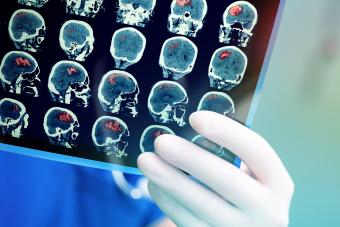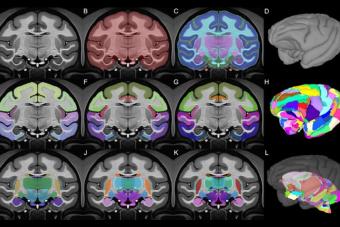Brain Health Neuroscience Laboratory
The Brain Health Neuroscience Laboratory at The University of Texas at Austin seeks to improve the lives of patients with chronic medical conditions by studying how diseases and their treatments affect brain health including cognition, sleep, mood and stress.
We use non-invasive, brain MRI scans to evaluate aspects of brain structure and function that contribute to changes in brain health. Our work focuses primarily on connectomics, which refers to brain network connectivity and organization. We have pioneered the application of connectomics to the study of cancer-related cognitive impairment. We have also developed open-source software for the statistical analysis of connectome properties and have published manuscripts regarding connectome methodology. We have conducted connectome studies in both humans and animals, providing unique translational insights regarding neurologic health and disease. Our expertise includes resting state fMRI connectivity, T1 MRI gray matter volumetrics, virtual white matter tractography of diffusion tensor imaging, and functional near-infrared spectroscopy.
We combine connectome properties and machine learning to predict various important clinical outcomes including cognitive status, quality of life and survival rate. The brain’s organization incorporates biological and environmental factors that make it a highly sensitive and parsimonious biomarker, superior to many behavioral assays. Thus, brain imaging is a powerful tool for precision medicine. Brain imaging can also be employed directly as an intervention. For example, we conduct neuromodulation studies, which involve training individuals to modify their brain health by visualizing their own brain function in real time.
Director
Shelli Kesler, PhD
Email: kesler.lab@austin.utexas.edu | Phone: 512-232-4762
Contact Information
Please contact us to discuss how you can participate in our research study by emailing us at kesler.lab@austin.utexas.edu.
Chemobrain eBook
Chemobrain Facts and Fictions eBook about cognitive effects of cancer.

PAC-AI Research Study
Predicting Brain Health After Cancer with Artificial Intelligence (PAC-AI) Research Study

COVID-19 Brain Research Study
COVID-19 Brain and Cognition Research Study

GLIOMA Research Study
Glioma Lifespan Indices Optimized by MRI Analysis (GLIOMA) Research Study

IMPACT Research Study
Imaging Macaques Prior to and After Chemotherapy Treatment (IMPACT) Research Study

